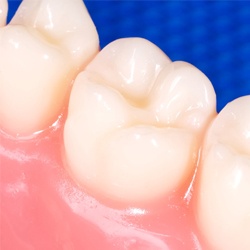Dental Sealants – Casper, WY
Giving Molars the Protection They Need

Back teeth are often the hardest to clean. As an adult, you can maneuver your toothbrush and floss in a way that a young child cannot. Our mouths are bigger, which means reaching these areas of our mouth are somewhat easier, yet, some adults still have a hard time cleaning their back teeth effectively. At Casper Children’s Dental, we want your child’s teeth to have the highest level of protection, which is why we offer dental sealants in Casper, WY. This quick and painless process covers the back molars and prevents cavities from developing. Think your child is ready for dental sealants? Give us a call and schedule an appointment today!
What Are Dental Sealants?

Does your child practice good oral hygiene habits at home? No matter the answer, dental sealants can be a beneficial treatment to talk to our dentists about. Brushing and flossing may be able to eliminate some of the food particles and bacteria from the teeth; however, when it comes to the chewing surfaces and all the crevices, only dental sealants can effectively “seal out” any bacteria and food particles.
Dental sealants are a thin, plastic coating that is applied to the chewing surfaces of your child’s back teeth. Known as the premolars and molars, these are often the hardest to reach for children to clean.
Once applied, the sealant creates a protective barrier over the tooth’s enamel, making it difficult for bacteria to penetrate, thus, reducing the chances of your child developing tooth decay and cavities.
Dental sealants are also great for adults and even some baby teeth, as it is important to keep these teeth clean and healthy to make way for the permanent adult teeth that will eventually come through.
How Does the Process Work?

During your child’s appointment, the process for applying dental sealants is quite easy. Their pediatric dentist in Casper will thoroughly clean your child’s teeth before placing a solution on the specific teeth, roughening the surface to allow the sealant to bond to the teeth.
Once the teeth are rinsed and dried, we will paint the thin, plastic coating onto the back premolars and molars. The sealant will bond to the tooth and harden. If necessary, we will use a curing light to help with the hardening process.
Why Are They Beneficial?

- Greater protection – Reaching those back molars can be difficult, so by having dental sealants placed over these teeth, you and your child can rest assured that they are receiving the added protection needed to keep tooth decay away.
- Promote stronger teeth – You want your child’s teeth to be healthy and strong. Much in the same way fluoride treatments strengthen tooth enamel, sealants encourage stronger, healthier molars.
- Allow you to keep more money in your pocket – If your child doesn’t develop cavities, you won’t have to worry about paying for a filling! Dental sealants keep your child from needing future dental work.
- Limit Bacteria – If you want to limit the exposure of bacteria in your child’s mouth, talk to us about dental sealants.
Dental Sealants FAQs

If you want to further protect your child’s teeth from decay and other serious dental problems, it’s time to consider dental sealants. This protective coating offers a barrier between their precious tooth enamel and harmful bacteria. At Casper Children’s Dental, this common treatment is provided to patients of all ages, especially those prone to cavities. Before having your child undergo the process of receiving dental sealants, we understand you probably have a few questions. The good news is your children’s dentist in Casper has already compiled some frequently asked questions for you to review. However, when finished, if you have any additional inquiries, please do not hesitate to contact us or schedule an appointment.
What age is appropriate for my child to receive dental sealants?
It is recommended that children with permanent molars receive dental sealants. Typically, the first set will erupt around the age of six, and the second set will arrive around the age of 12. By following this timeframe, which can vary depending on your child and their oral and facial development, you can better protect their teeth from future cavities.
How long will sealants last?
Depending on how well your child takes care of their teeth and gums, their dental sealants in Casper can last nearly a decade. It is possible they can fall off, so you’ll need to make sure to bring them in every six months for a regular dental checkup and cleaning to allow our team to examine their molars and ensure the sealants are still in place. Fortunately, if the sealant comes off, it is easy to replace and can be done in just minutes.
If my child is receiving fluoride through our water and by using toothpaste, are sealants still necessary?
Absolutely. Both fluoride and dental sealants are proven effective at combating tooth decay. However, fluoride works to protect against cavities by making tooth enamel stronger. Dental sealants create a barrier between tooth enamel and food particles that can easily burrow into the pits and grooves of their chewing surfaces, allowing bacteria to grow and spread. If you want to ensure your child’s smile is thoroughly protected, you’ll make sure they receive both fluoride treatments and dental sealants.
Will my child feel the sealants after they are placed?
While it is possible for your child to feel the sealants with their tongue after they’re immediately put into place, this will go away over time. Sealants are extremely thin and mold to the pits and grooves of your child’s teeth. Just like anything new that is placed into the mouth, it will be noticeable for a short time, however, as your child becomes more used to the feeling, they will be less likely to pay much attention to them.
